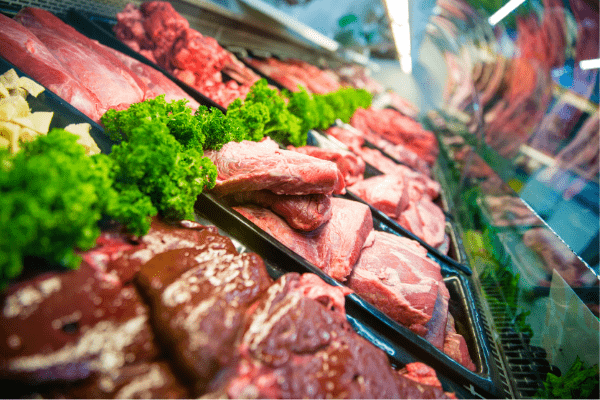America’s meat industry is a lot like how beer was in the 1980s, with a handful of giant corporations controlling the lion’s share of the market. That’s how Rod Ofte of Nordik Meats describes it in the latest Edible-Alpha® podcast. Four decades ago, Anheuser Busch, Miller and Coors were the undisputed beer kings. Similarly, today, JBS, Smithfield, Tyson, Cargill and National Beef sell the overwhelming majority of the protein in the U.S.
But neither industry started out that way. Once upon a time, “every little town used to have a butcher—and every little town used to have a brewery,” Rod explains. Consolidation and monopolization overtook both markets over time, forcing most local meat processors and breweries out of business.
But then the craft beer revolution happened. Over the last few decades, we’ve seen microbreweries pop up nationwide. It started slowly, but as more consumers discovered they prefer craft beer over Budweiser and began championing locally brewed, the pace of openings accelerated. Now, as Big Beer’s market share dwindles, it seems we’re back to every little town boasting a brewery and larger towns having several.
Could the same phenomenon happen with meat? That’s Rod’s dream—for the market to shift back to allowing mom-and-pop processors to thrive. He acknowledges that meat processing facilities face bigger hurdles than craft breweries, which are much cheaper to build, not as heavily regulated and fun destinations to visit. Yet he insists meat could undergo a similar transformation—“if consumers insist that their meat doesn’t travel thousands of miles.”
Will they, though? Sure, some consumers already choose locally raised and processed meat, but will demand ever reach critical mass?
It’s certainly possible, especially now that the COVID-19 pandemic has exposed the ugly realities of the meat industry. Last year’s sparse meat counters and coronavirus-riddled meatpacking plants opened people’s eyes like never before, and interest in locally produced and direct-to-consumer meat skyrocketed. Small-scale ranchers and processors nationwide reported unprecedented sales spikes while struggling to keep up with demand.
Although some consumers have resumed buying commodity meats in the waning days of the pandemic, many have not. There is still significant interest in meat that’s both raised and processed locally—and there is still a shortage of local facilities to handle it all.
Logically, heightened demand should beget new processing operations—just like craft beer craze spawned more craft breweries. But as we’ve discussed throughout our meat-focused podcast mini-series, meat processing is a tricky, costly and barrier-filled business, both to break into and make work financially. In the past, these factors have precluded many otherwise-interested parties from making a go at it.
However, over the last year, state departments of agriculture report an uptick in inquiries from people wanting to start meat plants. Meanwhile, legislative changes are opening more opportunities for existing and prospective local meat processors. For example, Wyoming passed a law last year allowing ranchers to sell meat direct to consumers without needing USDA-inspected slaughter. Iowa launched the Meat Processing Expansion and Development Program with $2 million in CARES Act funding.
At the federal level, USDA’s Cooperative Interstate Shipping Program—which allows some state-inspected plants to operate as federally inspected facilities that can ship products from state to state and internationally—just expanded to include a ninth state, South Dakota, last week. Additionally, the bipartisan Strengthening Local Processing Act was reintroduced in Congress this past February. If passed and signed into law, it would provide training, education and technical assistance to help develop and streamline small meat and poultry processing plants. It would also allow state-inspected meat products to be sold across state lines without USDA inspections.
While nobody knows what the future holds, the combination of surging consumer interest, a promising market opportunity, more readily available funds and more workable regulations may provide enough incentive and support for small processors to effect real change in the meat industry. Maybe we’re on the cusp of every little town having both a brewery and a butcher.

Wisconsin grass-fed beef producer and business consultant Rod Ofte helped launch Nordik Meats last summer, just as COVID-19 was ramping up and demand for local meat processing intensified. He joins Tera to share his experience starting the small plant during such a crazy time, explain its sustainable business model, discuss the issues facing meat processing and offer advice for other entrepreneurs in this space.
Listen to the Latest Podcast
Listen to other episodes of our Meat Processing Podcast Mini-Series
And now, our roundup of the best food and beverage finance news, events and resources from around the web…
 Business Model Insights
Business Model Insights
- The natural products industry can offer common ground in the Red Plate/Blue Plate politics of food (New Hope Network)
The culture wars have stretched the battlefield onto the dinner plate, with veggie burgers now perceived as an assault on the American way of life. But if the natural products industry can honor its back-to-the-land roots, it can share that ethos in a way that resonates across a variety of menus. - How to connect with those who can change the outcome of your business (New Hope Network)
- Examining how social media ‘micro-influencers’ are changing marketing (The Food Institute)
Raising Capital
- ‘How Boards Work’ offers lessons, warnings for directors (New Hope Network)
Economist and veteran corporate director Dambisa Moyo looks at how corporations are changing as investors, stakeholders expect more. - Loft Growth Partners seeks solutions-oriented startups led by ‘pathological optimists’ (FoodNavigator-USA)
- Expert Insights: Bert Glover of Impact Ag Partners (Regenerative Food Systems Investment Forum)
CPG/National Brands
- Big Food hit pause on switching to natural colors. What will it take to make the shift? (Food Dive)
Manufacturers point to a lack of consumer demand for swapping out artificial colors in brightly hued foods, but new research—and legislation—may force their hands. - Why Did It Take So Long for Food Companies to Rebrand their Racist Products? (Civil Eats)
- Consumer Brands Association tackles 3 long-haul COVID challenges for CPG industry (FoodNavigator-USA)

Market Trends
- Consumers weigh vegan & specialty diet attributes differently based on category, SPINS data shows (FoodNavigator-USA)
With nearly one in five Americans following some sort of specialty diet, the extent to which products appeal to different food tribes can heavily influence sales—but not all diets are equally important across all categories. - Trends at Natural Products Expo West Virtual Week viewed through a consumer lens (New Hope Network)
- IFIC Survey: Understanding the Purchasing Behaviors and Preferences of Dairy Consumers (Food Insight)

Farming and AgTech
- New research attempts to pinpoint “Why do small farms matter?” Critics say that’s not the right question (The Counter)
Making the food system more sustainable is a multipronged challenge. But in the U.S., farm size is only one piece of the equation. - Gary Zimmer on 50 years of biological, organic farming (EcoFarming Daily)
- A realist’s guide to pricing your product for the market (EcoFarming Daily)
Deals/M&A
- Danone partners with upstart to create food derived from the pongamia tree (Food Dive)
Collaboration with Danone will expedite Terviva’s development of golden, buttery cooking oil and highly soluble plant protein from the beans of the regenerative pongamia tree, which requires little to no fertilizer or pesticides. - Sambazon secures $45 million investment (Food Business News)
- Indoor farming company Bowery raises $300M (TechCrunch)

Industry Events
Virtual events:
- BevNET Live: 6/22–6/23
- NOSH Live: 6/22–6/23
- The Wall Street Journal Global Food Forum: 6/24
- Edible-Alpha® Quarterly Trends Talk: 6/28
- North American Agroforestry Conference: 6/28–7/2
- IFT FIRST: 7/19–7/21
- American Cheese Society Annual Conference: 7/28–7/30
- Direct 2021: The Virtual Conference for Your Farm Business: 8/3
- FFI Raising Equity Workshop: 9/21–9/23
- Natural Products Expo East Virtual Extension: 9/22–9/25
In-person events:
- Soil Health Academy: Transforming Your Dairy and Quality of Life: 6/22–6/24 in Cold Springs, MN
- Sweets & Snacks Expo: 6/25–6/28 in Indianapolis, IN
- Chicken Marketing Summit: 7/18–7/20 in Fernandina Beach, FL
- Acres U.S.A. Summer Intensive with Zimmer Ag: 7/19–7/20 in Lone Rock, WI
- MOSES Organic Field Day: Organic Row Crops Plus Prairie Restoration: 7/22 in Madison, SD
- MOSES Organic Field Day: Creative Land Access and No-Till Vegetable Research: 7/31 in Decorah, IA
- Soil Health Academy: Increasing Profitability Through Cropping System Management: 8/3–8/5 in Attica, IN
- Southern Family Farmers and Food Systems Conference: 8/8–8/10 in San Marcos, TX
- Dakotafest: 8/17–8/18 in Mitchell, SD
- MOSES Organic Field Day: Systems Approach to Organic Farming: 8/18 in Turtle Lake, WI
- MOSES Organic Field Day: Silvopasture for Livestock & Pollinators: 8/21 in Menomonie, WI
- SNAXPO21: 8/22–8/24 in Charlotte, NC
- Healthy Food Expo West: 8/22–8/24 in Anaheim, CA
- SupplySide East: 8/24–8/25 in Secaucus, NJ





